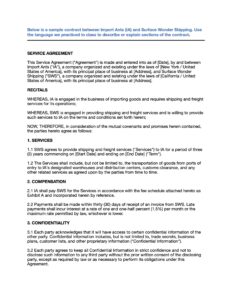Explaining Documents

Documents like contracts can be confusing even for native speakers. It can also take a long time to cover all the details which is why summarizing the contents and explaining key details is so helpful.
1. Summarizing and Paraphrasing
When we summarize, we say the same thing more concisely usually without examples or details. It is important to state the main points and keep the same meaning as the original.
When we paraphrase, we say the same thing in our own words. We often use simple, non-technical language, or similies.
Example
This Agreement, entered into on the 1st day of June, 2024, by and between XYZ Corporation (hereinafter referred to as ‘the Company’), a corporation organized and existing under the laws of the State of Delaware, and John Doe (hereinafter referred to as ‘the Consultant’), a professional consultant residing at 123 Main Street, Anytown, USA, outlines the terms and conditions under which the Consultant will provide consulting services to the Company. The Consultant agrees to provide the Company with strategic business advice, market analysis, and other services as described in Exhibit A, attached hereto and incorporated by reference. The term of this Agreement shall commence on June 1, 2024, and shall continue for a period of one year, unless earlier terminated in accordance with the provisions set forth herein. Compensation for the services rendered by the Consultant shall be as detailed in Exhibit B, also attached hereto and incorporated by reference. The Company reserves the right to terminate this Agreement at any time with thirty (30) days written notice to the Consultant. In the event of such termination, the Company shall pay the Consultant for all services performed up to the date of termination.
To summarize, XYZ Corporation and John Doe have entered into a one-year consulting agreement starting June 1, 2024. John Doe will provide strategic business advice and market analysis. The Company can terminate the agreement with 30 days’ notice, granted they pay for services performed up to termination.
Basically, starting June first, John Doe will do some standard consluting for XYZ. He’ll provide strategic business advice and market analysis. If the company decides to end the contract early, they have to tell John at least 30 days in advance and pay for the work he did up to that point.
What to Say
There are many, many ways to summarize information from articles, meetings, documents, conversations, and more. Below, are some examples to get you started.
• This section highlights the steps to impliment the system.
• This point emphasizes the need for employee training.
• This agreement specifies conditions for termination.
• Section two indicates the rights of the buyer.
• According to the text, the agreement will last three years.
• As described, the consultant will provide financial services.
• Point six states that disputes will be settled through arbitration.
• The agreement provides a specific timeline.
• The company reserves the right to end the contract.
• The consultant is entitled to three months’ severance pay.
• The client is eligible for review every six months.
• The employee has the right to 20 days paid vacation.
• The consultant is required to deliver complete file lists.
• The company must ensure all safety protocols are followed.
• The employee shall adhere to proper dress code.
• The company is obligated to provide additional information upon request.
2. Explaining Key Details
Key words and details in documents sometimes need a litle more focus. Use some of the following phrases to explain them clearly.
• What exactly does “force majeure” mean?
• I’d like you to explain what “indemnification” means.
• Could you clarify what you mean by “severability?”
• Can you explain what you mean by this term?
• Do you mind explaining this part?
• Force majeure means events like natural disasters that prevent us from completing our obligations in the contract.
• Indemnification refers to compensating someone for loss.
• Severability signifies that if one part of a contract is invalid, the rest of the contract is still OK.
• Force majeure is sometimes called an “act of god” in English.
• Other ways to say indemnification are reimbursement or compensation.
• You can also call separability a “separation clause.”
• Force majeure is as if god stopped our plans.
• Indemnificatoin is like a safety net. It provides support in case of an accident.
• Seperability is akin to the branches of a tree. If one breaks, the tree is still strong.



